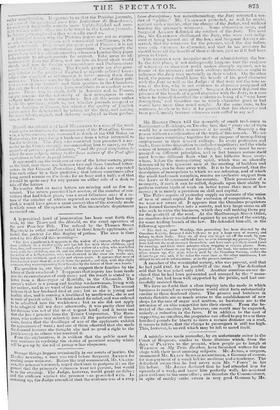Mr. Roaster OWEN told the assembly of small tradesmen in
Suathain Bindings, on Tucsdas last, that " every one of them would be a monopolist to-morrow it he could." Scarcely a day passes without a contirination of the truth of this remark. We see the workmen combining together for the purpose of monopolizing employment in their several callings. In every profession and trade, there is the disposition to exclude competitors ; and the whole course of human affairs must ha changarl, society must be reor- ganized on different principles, and in filet human nature itself must become different front what it has hitherto been every- where, before the monopolizing spirit, which was so absurdly denounced by the ignorant men at the meeting of builders and bricklayers, can be done away with. It is to be observed, that the description of monopolists to which we are referring, and of which the small tradesmen complain, receive no exclusive support from the Laws or Government of the country. Their possession of a monopoly, it' such it can be called, depends upon their ability to perform certain kinds of work on better terms than men of less means; it is merely a premium on skill and capital.
The Police reports of yesterday supply an instance of the union of meta of small capital for the exclusion of competitors, which we were not aware of. It appears that the Omnibus proprietors have formed themselves into a society, and levy large sums on all who seek to enter the business, which they call making them pay for the goodwill of the road. At the Marlborough Street Office, an omnibus-driver was informed against by an agent of the society, for some tritling breach of the law. He defended himself; in the following speech- " The fact is, your Worship, this proceeding has been directed by the Omnibus Society, because I didn't choose to pay a large stun of money, and belong to their body. They do all they can to act me cif the road, by run- ning omnibuses before me and behind me. so as to intercept my passengers. They have laid out the road amongst themselves, and have each got their stated times for running, and their three minutes when stopping at certain places. Now, because I don't choose to pay for the goodwill of the road, the moment my om- nibus comes up, this man, who is paid by the Omnibus Society, orders the driver to 6O on ; and, if he takes the saute time as the other omnibuses, I am obliged to attend to informations, as in the present instance."
A member of the worshipful society, who was present, said that he bad paid 288/. for his goodwill of time road. The defendant said that he was asked only 130/. Another omnibus-owner de- clared that he had been persecuted and annoyed by the " mono- polists," but had been well supported by the public, and had suc- cessfully resisted them.
We have no doubt that a close inquiry into the mode in which business is carried on everywhere would elicit facts substantially similar to those disclosed above. The grocers and butchers in certain districts are as much averse to the establishment of new shops for the sale of sugar and mutton, as barristers are to the intrusion of an able competitor into their circuit. From the be- trayal of the omnibus plot, however, one result may be expected, namely, a reduction in the fares. If in addition to the cost of supporting an omnibus, the proprietor can afford to pay two or three hundred pounds for liberty to drive a certain distance on a road, it seems to follow, that the charge to passengers is still too high. This, however, is an evil which may be left to mend itself.




















 Previous page
Previous page